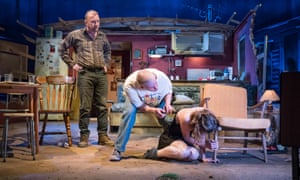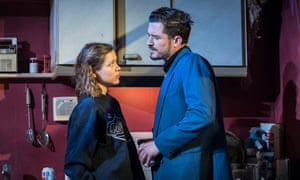Even with a big movie star, Orlando Bloom, in the title role, it is a risky move to revive Tracy Letts’s 1993 play right now. This, after all, is a work that, aside from its grisly violence, involves the explicit seduction of a 20-year-old woman and forces her stepmother into an act of mock fellatio with a chicken leg. But I would absolve Letts, who went on to write August: Osage County, from the charge of exploitation in that he is clearly making a serious point about a society caught between a dimly remembered Christian morality and an all-too-vivid cultural degeneration.
However uncomfortable the play makes you, Letts keeps you hooked from the outset. A visibly deranged young guy, Chris, bursts into the Texan trailer home occupied by his dad, his stepmother and his sister. Since Chris is heavily in debt to the mob, presumably over a failed drug deal, he has a simple proposal. He suggests to his dad, Ansel, that they hire a hitman to bump off the old man’s first wife and divvy up the insurance claim of which Chris’s sister, Dottie, is the beneficiary. There’s only one problem: they don’t have any money and when they finally meet the contract killer, Joe Cooper, he demands a substantial down payment in the form of Dottie.

On one level, Letts’s play is like a blackly comic parody of a whole raft of family dramas. I was reminded of Harold Pinter’s The Homecoming in the readiness of these Texans to use Dottie as a bargaining chip, of Sam Shepard’s Buried Child in the portrait of a grotesquely dysfunctional family and even of Tennessee Williams’s The Glass Menagerie: the scene in which Joe comes to pay court to the shyly virginal Dottie has echoes of the gentleman caller’s encounter with Williams’s nervy Laura Wingfield.
That last scene confirms my belief that Letts’s characters all exist in some strange half-world. Bloom excellently suggests Joe’s cool confidence, exaggerated politesse and head for business. He exudes easiness, style and restrained swagger, yet Bloom never lets you forget that Joe is a hired killer who also happens to be a ruthless policeman. The family, who say grace before dinner, are also torn between an ethical past and a debased present in which their values are dictated by an endless diet of TV cop shows such as Cannon and Mannix. Without being preachy, Letts’s play is, among other things, an attack on a popular culture that distorts people’s sense of reality.

I admit to feeling uneasy at the play’s use of female nudity – though, possibly in the interests of gender equality, we also get to see Bloom’s bare bottom – and Simon Evans’s production overplays the atmospheric thunder and lightning and undercooks the comedy. It is, however, extremely well acted. Sophie Cookson admirably suggests that Dottie’s seeming simplicity conceals a sharp-eyed awareness, Adam Gillen captures her brother’s borderline hysteria born out of a thwarted incestuous passion while Steffan Rhodri as their father and Neve McIntosh as their stepmother nicely mix the dim and the deceitful.
Cleverly plotted and queasily gripping, Letts’s play offers a prophetic portrait of a society that, in its reliance on the small screen, is in danger of entertaining itself to death.
• At Trafalgar Studios, London, until 18 August. Box office: 0844-871 7632.